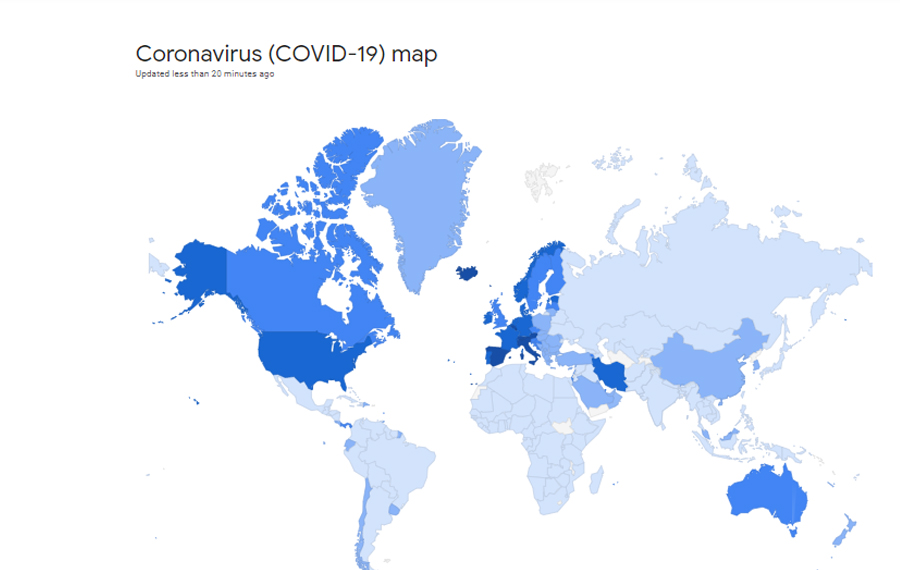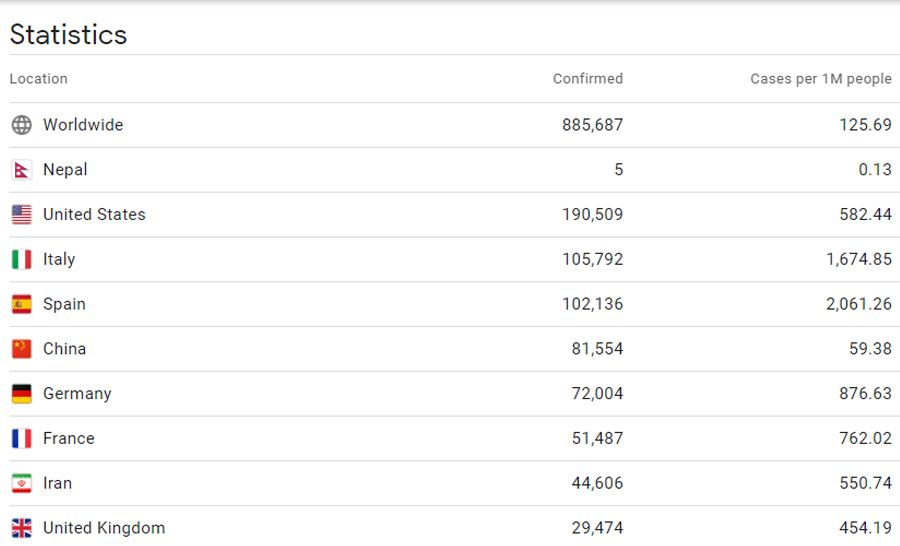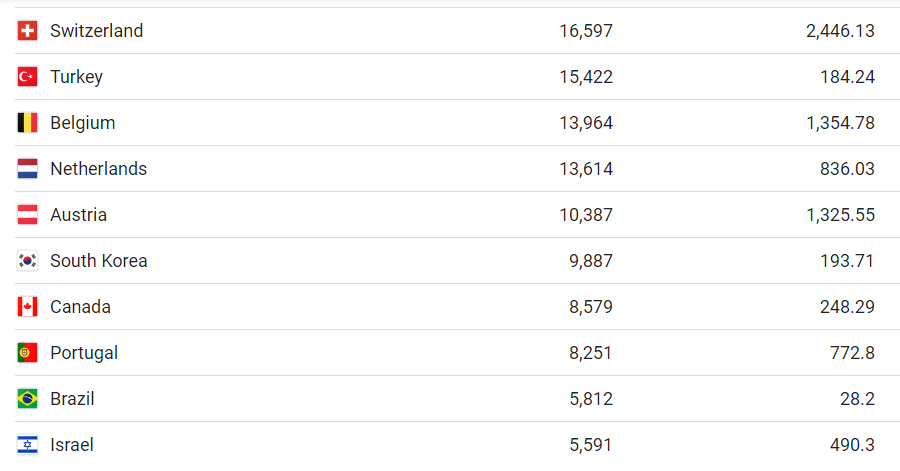COVID-19 effects ripple around world as global coronavirus death toll passes 42,000

Coronavirus (COVID-19) map
Beijing|2020-04-01 Wednesday(Xinhua)
The COVID-19 pandemic continued its spread around the world, putting enormous strains on society and economy, as the death toll from the novel coronavirus disease has passed 42,000 worldwide.
As of 0400 GMT Wednesday, nations and regions have reported a total of 42,332 deaths from COVID-19, along with almost 860,000 confirmed cases, while more than 178,000 people have recovered, an interactive map maintained by Johns Hopkins University’s Center for Systems Science and Engineering showed.
SURGING DEATHS
Spain’s health authorities confirmed on Tuesday that the country has seen 849 new deaths in the past 24 hours, a new high over 838 reported on Sunday, bringing its death toll to 8,189.
On Tuesday, Spain’s total number of coronavirus cases increased by 9,222 to 94,417, a higher daily rise in new cases than on Sunday and Monday, when 6,549 and 6,398 new cases were confirmed respectively.
The coronavirus cases in France have reached 52,128, with a death toll of 3,523, General Director of Health Jerome Salomon announced on Tuesday at a daily briefing.
In the last 24 hours, 7,578 more people were diagnosed with COVID-19, which claimed 499 more lives, the biggest fatalities caused by the virus in one day.
The coronavirus pandemic continued to advance in locked down Italy on Tuesday, bringing the total number of infections, fatalities and recoveries to 105,792, according to the latest data released by the country’s Civil Protection Department.
The country’s death toll on Tuesday was 837, bringing the total fatalities to 12,428 since the pandemic first broke out in northern Italy on Feb. 21.
Also, health experts on the White House Coronavirus Task Force said Tuesday that even with the country’s national social distancing guidelines in place, the United States still should be prepared for the prospect of the coronavirus causing 100,000 to 240,000 deaths in the country.
Presenting the models before reporters at a White House press briefing, Deborah Birx, the task force’s response coordinator, said as many as 1.5 million to 2.2 million people will succumb to COVID-19 if no mitigation measures whatsoever are taken to contain the virus.
“MOST CHALLENGING CRISIS”
United Nations Secretary-General Antonio Guterres on Tuesday said that the COVID-19 pandemic is the most challenging crisis since World War II.
The pandemic “represents a threat to everybody in the world and … it has an economic impact that will bring a recession that probably has no parallel in the recent past,” Guterres said at the virtual press launch of the UN report “Shared responsibility, global solidarity: Responding to the socio-economic impacts of COVID-19.”
“This is, indeed, the most challenging crisis we have faced since the Second World War and the one that needs a stronger and more effective response that is only possible in solidarity if everybody comes together and if we forget political games and understand that it is humankind that is at stake,” the UN chief said.
The World Bank announced on Monday that it projected growth in developing economies in East Asia and the Pacific region to slow to 2.1 percent in the baseline scenario amid the COVID-19 pandemic, from an estimated 5.8 percent in 2019.
Noting that making precise growth projections is unusually difficult in a rapidly changing environment, Aaditya Mattoo, chief economist for East Asia and the Pacific at the World Bank, told reporters that the new report presents both a baseline and a lower-case scenario for growth in 2020, which is 2.1 percent and negative 0.5 percent, respectively.
The economist said the COVID-19 shock will also have a serious impact on poverty. The report estimates that under the baseline growth scenario, nearly 24 million fewer people will escape poverty than would have in the absence of the pandemic.
If the economic situation deteriorates further and the lower-case scenario prevails, then poverty is estimated to increase by about 11 million people, Mattoo said.
CONTROL EFFORTS
Canada’s largest city, Toronto, on Tuesday announced the cancellation of mass events permitted by the city through June 30 to stem the spread of the coronavirus.
“While the city recognizes the importance of special events and festivals to the livability and vitality of the city, protecting the health and safety of residents is of primary concern,” Mayor John Tory tweeted.
“This is not an easy decision to make but it is necessary to protect the public and save lives,” he added.
The Iraqi authorities Tuesday also decided to extend the nationwide curfew until April 19 to contain the spread of the coronavirus, said Iraqi Health Minister Jaafar Sadiq Allawi, also head of the Iraqi crisis committee to contain COVID-19, in an interview with local Dijla TV channel.
Meanwhile, noting that he has been in touch with world leaders about the pandemic, Guterres said that “there is a growing consciousness that we are in this together, and we need to come out of it together.”
“The problem is how to create the practical ways to do so,” said the secretary-general, adding that fast action is critical.
“We are slowly moving in the right direction, but we need to speed up, and we need to do much more if we want to defeat the virus and if we want to support the people in need,” he added.












